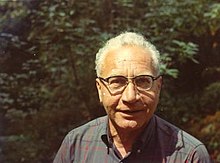Michel Loève
Michel Loève | |
|---|---|
 | |
| Born | January 22, 1907 |
| Died | February 17, 1979 (aged 72) |
| Nationality | French, American |
| Alma mater | University of Paris |
| Known for | Karhunen–Loève theorem |
| Scientific career | |
| Fields | Mathematics |
| Institutions | University of California, Berkeley University of Lyon, University of Paris University of London |
| Doctoral advisor | Paul Lévy |
| Doctoral students | Leo Breiman Emanuel Parzen |
Michel Loève (January 22, 1907 – February 17, 1979) was a French-American probabilist and mathematical statistician, of Jewish origin.[1] He is known in mathematical statistics and probability theory for the Karhunen–Loève theorem and Karhunen–Loève transform.
Michel Loève was born in Jaffa (then part of the Ottoman Empire) in 1907, to a Jewish family. He passed most of his childhood years in Egypt and received his primary and secondary education there in French schools. Later, after achieving the grades of B.L. in 1931 and A.B. in 1936, he studied mathematics at the Université de Paris under Paul Lévy, and received his Doctorat ès Sciences (Mathématiques) in 1941. In 1936 was employed as actuaire of the University of Lyon.
Because of his Jewish origin, he was arrested during the German occupation of France and sent to Drancy internment camp. One of his books[2] is dedicated "To Line and To the students and teachers of the School in the Camp de Drancy". Having survived the Holocaust, after the liberation he became between 1944 and 1946 chief of research at the Institut Henri Poincaré at Paris University, then until 1948 worked at the University of London.
After one term as a visiting professor at Columbia University he accepted the position of professor of mathematics at Berkeley, in 1955 adding the title professor of statistics.
He is the author of one of the earliest books on measure-theoretic probability theory and one of the best known textbooks.[3] He is memorialized via the Loève Prize created by his widow Line.[4]
See also
[edit]References
[edit]- ^ Simon, Marielle (2010). "An insight into the life of Michel Loève through his correspondences with Paul Lévy, Maurice Fréchet and Jerzy Neyman" (PDF). Journal Électronique d'Histoire des Probabilités et de la Statistique. 6 (1): 15. MR 2660947.
- ^ Loève, Michel (1955). Probability Theory. Princeton, New Jersey, USA: D Van Nostrand. pp. xvi+685.
- ^ Hoffman-Jorgensen, J. (1994). Probability with a View Towards Statistics. Vol. 2. CRC Press. p. 131. ISBN 9780412052217.
For a long time Loève's book served as the standard textbook on advanced probability theory.
- ^ "The Loeve Prize". www.stat.berkeley.edu. Retrieved 2024-03-22.
External links
[edit]- 1907 births
- 1979 deaths
- French statisticians
- French probability theorists
- University of Paris alumni
- Academics of the University of London
- Columbia University staff
- University of California, Berkeley College of Letters and Science faculty
- 20th-century French mathematicians
- Egyptian emigrants to France
- French emigrants to the United States
- Emigrants from the Ottoman Empire to Egypt
